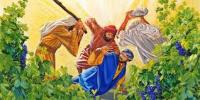
A vineyard is frequently used as a symbol in both the Old and New Testaments. This is the third Sunday in a row in which this image has been used; the story in today’s gospel is really an allegory, in which the relationship of God and the people of Israel is explored. God is the vineyard owner and the vineyard can be seen as Israel. The tenants are the rulers of the people who constantly betray their trust. The servants he sent to collect the produce are the prophets, who were attacked or killed for acting as mouthpieces for God when they preached repentance. Jesus of course is the Son who the tenants also killed. He was crucified outside the city, being figuratively thrown out of his property. In 70 AD Jerusalem and the Temple, centre of Jewish worship, were destroyed by the Romans. The Old Covenant was completed. Gentiles and Jews who acknowledged Christ would take over management of the vineyard.
This however is not an excuse for anti-Semitism. We owe a great debt to the Jewish people for their writing of the sacred scripture which is our heritage. From Israel came Jesus and his mother, who lived lived and died as faithful Jews. Now we have the responsibility for the vineyard, collectively and personally. Jesus at the Last Supper described himself as the vine: as the branches we are attached to him who sustains and nourishes us.
Pope Francis in his encyclical Laudatio Si’ calls us all to cherish the earth and repair the damage done to our common home, God’s vineyard.